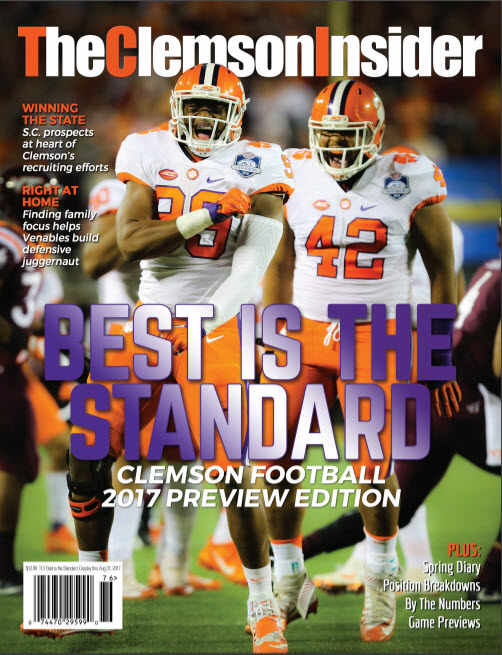I know when his career at Clemson is over, Dabo Swinney will be regarded as the greatest head coach Clemson has ever had in football. But how do you rank the greatest coaches in school history in terms of their importance?
My point is this, without Jess Neely and him getting IPTAY started where would Clemson be right now? Can you imagine?
When Neely became head coach in 1931, the program was on a down spiral. It had been years since John Heisman was beating up the likes of Alabama, Georgia, Georgia Tech and South Carolina, and though Josh Cody won 29 games in four years from 1927-’30, the program had nothing left.
Clemson, a small military and agriculture college at the time during America’s Great Depression, was struggling to stay afloat and it was getting harder and harder to fund its football program, a program it has always been extremely proud of.
On October 16, 1931, Clemson suffered a surprising 6-0 loss to The Citadel in a game played in Florence, S.C. After the game Neely, Captain Frank Jervey and others met in the parking lot outside the stadium to discuss ways Clemson could get its football program back on track. The meeting got the ball rolling toward the establishment of the IPTAY Foundation.
In 1934, IPTAY began and by the end of the decade Clemson was a winner again. Neely’s last two teams went a combined 16-2-1 and the 1939 squad accepted the program’s first bowl invitation and beat Boston College, 6-3, in the 1940 Cotton Bowl.
What about Frank Howard and what he did with the program?
When Neely left Clemson for Rice following the Cotton Bowl, he turned the program over to Howard. Before he left, he told Howard one important message.
“Don’t ever let them talk you into building a big stadium,” the Hall of Fame coach said to Howard. “Put about 10,000 seats behind the YMCA. That’s all you’ll ever need.”
As we know, Howard did not listen.
Clemson Memorial Stadium opened on September 19, 1942 with 20,000 seats. Seventy five years later, Memorial Stadium now seats 81,500 fans and is one of the largest on campus stadiums in the country.
However, despite the nice stadium no one would come to Clemson and play the Tigers during Howard’s 30 years as head coach. Most years, Clemson played just four home games when Howard was coaching because he had to take his teams to other places to play so he could make the program and athletic department some money and keep it relevant.
Howard still won his fair share of games, 165 to be exact. His teams went to major bowl games and won them when it was not easy to go to bowl games. He won six ACC Championships and two SoCon titles while his teams played in six bowl games and won three of them, including the 1951 Orange Bowl. His 1948 team went 11-0 and won the Gator Bowl that year while finishing 11th in the country – the highest ranking in the Associated Press Poll by any Clemson team at the time.

Danny Ford posted a 96-29-4 record in his 11 years as Clemson’s head coach (1978-’89) and won 5 ACC titles and the 1981 National Championship. (File photo)
Howard’s success set up Danny Ford’s success in the 1980s. Without the Hall of Fame coach putting the Clemson program on the map in the 1940s, ’50s and 60s, Clemson would not have had the level of respect that it did in college football. Of course the success of Charlie Pell’s ’77 and ’78 teams helped as well.
However, what Ford did was take Clemson to another level and proved that little ole Clemson could win a national championship. Even after the probation years from 1982-’84, he kept the program at a high level, winning 87 games in the decade of the 1980s—the fifth best in country—including five ACC Championships to go with the 1981 National Title. He had four teams win 10 or more games and two 9-1-1 teams as well as an 8-2-2 team. He also beat all of the big wigs in college football … Nebraska, Ohio State, Notre Dame, Penn State, Oklahoma, Georgia and Florida State.
Ford, who is also in the College Football Hall of Fame, was 5-2 in bowl games at Clemson.
Without Ford and the 1981 National Championship, Dabo Swinney would not have had the foundation to build on. Ford’s success at Clemson in the 1980s proved Clemson could win at the highest level and could be an elite program.
Swinney took what Ford did and has taken Clemson to a much higher level. He has won one national championship, played for it another time and has won three ACC Championships as well. Two teams won 14 games and two more won 11. He has guided the program to six straight 10-win seasons and one of his other teams won nine games.
In just eight full seasons Swinney’s teams have won six bowl games and four of them have finished inside the top 10 in the final AP Poll.
So see, without Jess Neely, there is no Frank Howard and without Howard there is no Danny Ford and without Ford there is no Dabo Swinney. They all tie together like a perfect bow.
Who is the greatest coach in Clemson history? I think they all are.
Hot off the Press!!! Have you ordered the 2017 Clemson season preview ‘Best is the Standard’ from the staff that covers Clemson football 365 days a year? Order yours today to make sure you get a copy!
